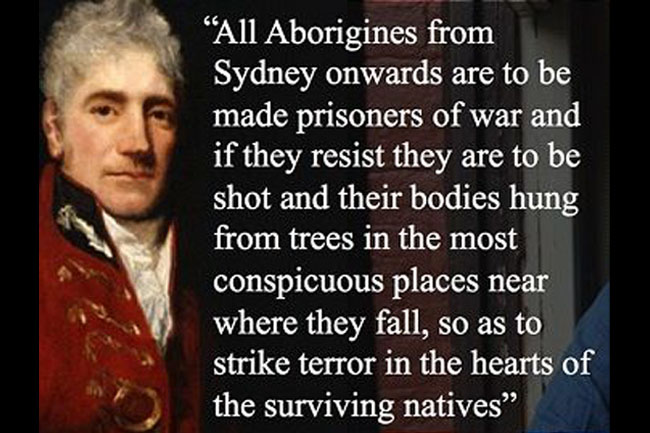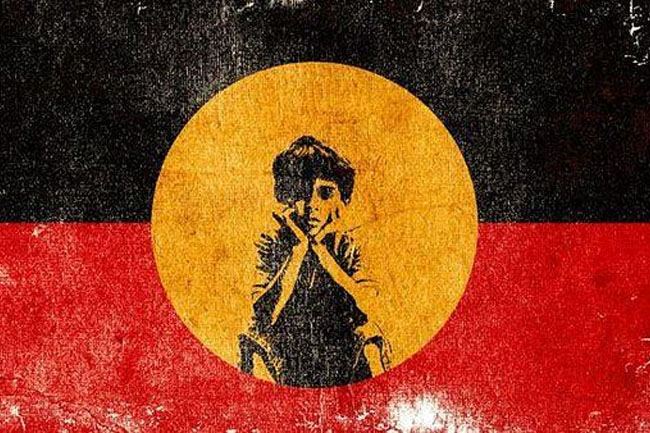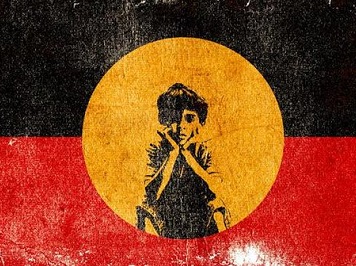The law is not colour blind. The law sees colour and makes sure that the status quo of black oppression remains, writes Indigenous affairs editor Natalie Cromb.
AUSTRALIA IS a country that considers itself developed and “civilised”. It espouses an air of superiority when referring to places beyond our shores.
We have no right to think or utter these beliefs because we are a heinous country that flouts human rights as an inconvenience and we fail every measure of decency when it comes to:
- vulnerable citizens;
- Asylum seekers and refugees;
- Indigenous Australians; and
- Children.
In Australia, the colour of your skin matters. In Australia, the size of your bank account matters. Because both of these factors have a direct bearing on your access to justice.
"In Australia, the colour of your skin matters.
In Australia, the size of your bank account matters.
Because both of these factors have a
direct bearing on your access to justice."
The Royal Commission into the detention of children and the child protection system in the Northern Territory is currently underway and we have heard evidence that defies belief — except if you’re Indigenous. If you’re Indigenous, you know all too well that this is not unusual conduct in the criminal justice system.
Dylan Voller giving evidence at the NT Royal Commission.
Image via ABC news.
This week, we have heard from Dylan Voller, the young man at the centre of ABC Four Corners footage of abuse that occurred in Don Dale Detention Centre where children alleged to have been “rioting” according to guards, where seen clearly in the footage to be in their own cells and were set upon by guards and subjected to violence, tear gas and subjected to expletive-filled denigration by the guards.
At the Commission hearing, Dylan gave testimony about his treatment in various facilities during his detention periods, which first started at the age of ten, with experts saying that he was failed by the system from the outset.
A particularly dehumanising method of punishing children in detention was, as Dylan recalled during testimony, the way guards would inhibit the detained children’s access to toileting facilities.
Said Dylan:
“There was one instance where I was in an isolation placement at Alice Springs detention centre and I was busting to go to the toilet ... I had been asking for at least four or five hours. They’d just been saying ‘no’. I ended up having to defecate into a pillow case because they wouldn’t let me out to go to the toilet. Eventually when I got let out the next morning, I was able to chuck that pillow case out.”
Dylan also testified that when guards allowed him to visit the bathroom they would only give him “five tiny little squares of toilet paper”.
Dylan again:
“I’d go to the toilet, they’d only rip off, like, five tiny little squares of toilet paper and they’d say ‘That’s all you’re getting ... make it last’.”
Dylan Voller's case worker, Antoinette Carroll gives evidence: "Dylan set up to fail".
Antoinette Carroll, the youth justice advocacy project coordinator at the Central Australian Legal Aid Service (CAALAS), provided evidence at the Royal Commission as she has worked with Voller since he was first sentenced to 18 months in detention for what she described as low-end offending.
On Tuesday morning, she testified that there was "an overwhelming lack of therapeutic support in place" for Voller, who had challenging behaviours.
She described an ad-hoc uncoordinated approach to how he should travel through care and the justice system. Ms Carroll said one of the key recommendations from the NT's youth justice review was to establish a therapeutic Court model that would divert young people away from the justice system.
Said Ms Carroll:
"Sadly, diversion wasn't really made available to him, and it should have been given the low level of his offending.”
Dylan’s evidence continued and he detailed the violence experienced, in addition to blatant racism, where he says he was subjected to tear gas, beatings, violent restraint, food and light deprivation among other abuses.
Dylan remains in the same location, with the same guards who committed the violence that we bore witness to in the Four Corners program.
His mother said in the lead up to the Royal Commission:
“I have never seen my son so scared in all of his life. He has said he will start a hunger strike to fight for his own safety. They are saying he may not even be allowed to attend court to speak with the Royal Commission and may have to give evidence via video link, under the eye of his abusers. He is too scared to do this.”
Concluded Ms Voller:
"The government promised change with this Royal Commission, but my son has just been put in further danger. When will this nightmare end.”
Padraic Gibson from UTS: Jumbunna Research Media has been assisting the Voller family with a campaign for Dylan’s freedom.
In a press release, he said:
How can this Royal Commission have any integrity when the NT government is allowing key witnesses to be threatened with violence if they speak the truth? We need to see urgent action from Chief Minister Gunner. He promised a change in approach to corrections, but has refused to even meet with Dylan’s family to discuss his ongoing abuse.
Many of these guards should have been sacked long ago for their torture of Aboriginal children. The fact that they remain not only employed, but tasked with guarding Dylan, speaks volumes about the continuing racism and disrespect for Aboriginal lives that characterises the ‘corrections’ system. Dylan must be set free immediately.
As abhorrent as the treatment of Dylan Voller is and has been — his situation is not unique.
The criminal justice system is failing in its clear racist application and this has received international attention following a visit from United Nations Special Rapporteur on contemporary forms of racism, Mutuma Ruteere, who has spoken candidly about Australia’s problem with racism at the conclusion of his tour of Australia, stating that Australia and its political leaders need to condemn racism.
In a press release issued in Canberra of 5 May 2016, Mr Ruteere said [IA emphasis]:
‘I have also been made aware of the challenges of continuing racial discrimination faced by indigenous people as well as other groups in Australia. I am aware that indigenous people continue to be incarcerated at a disproportionate rate. I am particularly concerned about the incarceration of juveniles from the indigenous communities and their treatment by the criminal justice system.’
Mr Ruteere considers the policing to be a critical element in overhauling the justice system and how it is administered upon Indigenous people, he says
'The current policing of Indigenous communities is too punitive and need an urgent change as its consequences can only lead to even further devastation of these communities.'
The Australian community, by a large majority, is ignoring or ridiculing the testimony of Dylan Voller, who is speaking out at significant risk to his own safety.
But what they fail to rationalise in their haste to vilify Dylan is that this is a child who has been failed by the system and, while under the care of the system, has been subject to brutal violence and denied his basic human rights.
The criminal justice system that allows a vulnerable woman to receive a custodial sentence for a fine, be treated so inhumanely while in custody and denied proper medical care leading to her painful death, also allows police officers to escape punishment for murder, and children to be detained and brutalised by adults while detained.
This same criminal justice system allows a non-Indigenous man to walk free after killing an Aboriginal child while drunk driving.
The criminal justice system is racist from its policy to its administration and with each institution engaged in the administration of “justice”.
The law is not colour blind. The law sees colour and makes sure that the status quo of black oppression remains.
Natalie Cromb is indigenous affairs editor and a proud Gamilaraay woman. You can follow Natalie on Twitter @NatalieCromb.

This work is licensed under a Creative Commons Attribution-NonCommercial-NoDerivs 3.0 Australia License
Monthly Donation
Single Donation
Fairness and justice. Subscribe to IA for just $5 (or less).









